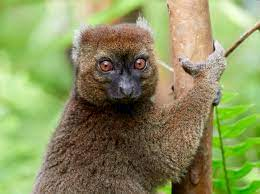Bamboo lemurs, the enchanting inhabitants of Madagascar's lush rainforests, bring a touch of magic to the treetops. These large, fluffy primates, adorned with round faces and big expressive eyes are captivating creatures.
One can't help but be mesmerized by the thick and soft fur of bamboo lemurs, ranging in colors from rich brown to deep black. Their appearance, with small ears and a pair of big, expressive eyes, gives them an almost teddy bear-like charm. This remarkable fur not only provides insulation against the tropical elements but also adds to their overall allure.
Bamboo lemurs, like their lemur relatives, boast a long bushy tail that serves as a multifunctional tool. This tail aids in navigation through the intricate network of branches and helps maintain balance as they gracefully move through the treetops.
True to their name, bamboo lemurs are specialists in bamboo consumption. Bamboo forms the cornerstone of their diet, and they've developed unique adaptations to thrive on this fibrous plant. From intricate molar patterns to a digestive system capable of processing tough bamboo fibers, these lemurs have evolved to be bamboo connoisseurs.
Bamboo lemurs are social beings, often found in groups that enhance their survival prospects. Living harmoniously, they engage in activities such as grooming and communication through a series of vocalizations and body language. These lemurs have a unique way of maintaining social bonds, contributing to the overall cohesiveness of their community.
Despite their enchanting presence, bamboo lemurs face the challenges posed by habitat loss and fragmentation, driven by human activities. As their rainforest homes shrink, these gentle giants find themselves at risk. Conservation efforts are crucial to ensuring the survival of bamboo lemurs and the delicate ecosystems they call home.
Raising awareness about the plight of bamboo lemurs and supporting ecotourism initiatives can contribute significantly to their conservation. By appreciating these gentle giants in their natural habitat, we foster a connection that transcends borders, emphasizing the importance of protecting Madagascar's unique biodiversity.
